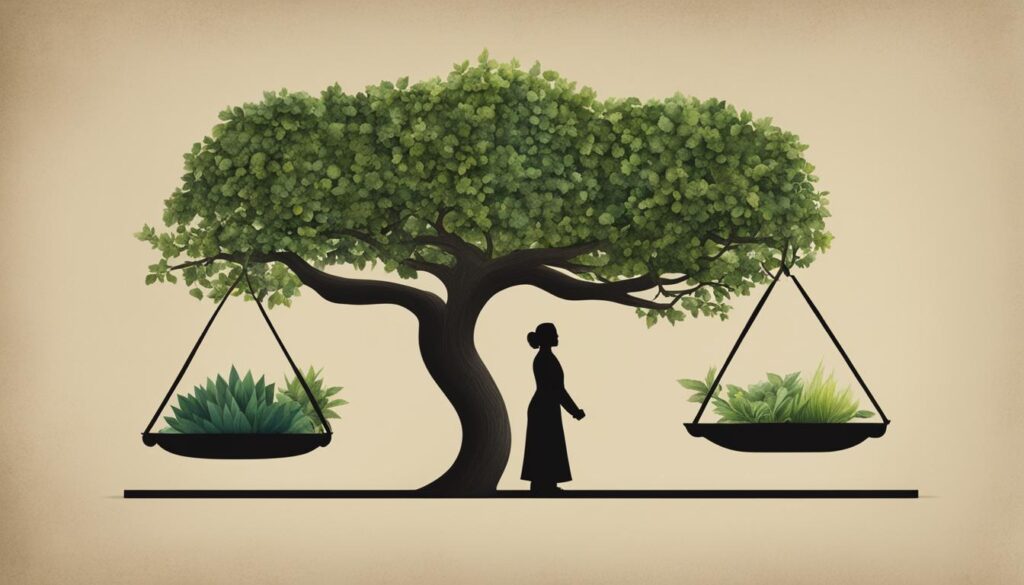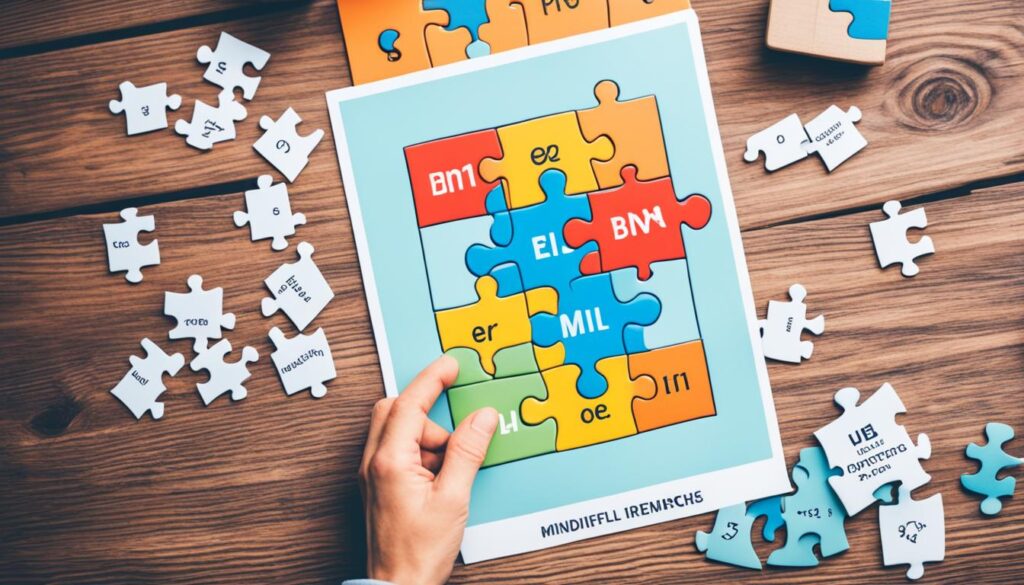“Do not dwell in the past, do not dream of the future, concentrate the mind on the present moment.” – Buddha
In relationships, it’s common to feel like you’re constantly doing something wrong or facing insecurities. But instead of dwelling on the past or worrying about the future, focusing on the present moment can help you transform your doubts into strengths. By being fully present and aware, you can address relationship challenges head-on and create a stronger and more fulfilling connection.
In this article, we will explore power dynamics in relationships, examine ways to balance them, and discover unexpected methods to deepen your emotional connections. We will also delve into the power of relational mindfulness and how it can enhance your relationships with both friends and partners. So let’s dive in and learn how to overcome relationship challenges and develop healthier dynamics that bring you closer to your loved ones.
Key Takeaways:
- Being fully present in the relationship can help transform doubts into strengths.
- Understanding and addressing power dynamics is crucial for creating balanced relationships.
- There are unexpected ways to deepen emotional connections and improve relationship dynamics.
- Relational mindfulness can enhance relationships with both friends and romantic partners.
Understanding Power Dynamics in Relationships
Power dynamics in relationships play a significant role in shaping how partners interact with each other. These dynamics can create an imbalance of power that leads to resentment, endless arguments, and emotional distance. It is crucial to recognize and address these power dynamics to create a healthier and more balanced relationship.
Common Power Dynamics
Several common power dynamics can occur in relationships, each with its own set of challenges. By understanding these dynamics, you can begin to identify and navigate them more effectively. Let’s explore some of the most common power dynamics:
- Demand/Withdrawal Dynamics: This dynamic arises when one partner makes demands or expresses their needs, while the other partner withdraws or avoids confronting the issue. This can lead to frustration, as the partner making demands feels unheard, and the withdrawing partner may feel overwhelmed.
- Distancer/Pursuer Dynamics: In this dynamic, one partner acts as the distancer, seeking emotional or physical space, while the other partner takes on the role of the pursuer, seeking more connection and intimacy. These differing needs can lead to tension and feelings of abandonment or suffocation.
- Fear/Shame Dynamics: Fear and shame dynamics can develop as a result of past traumas or insecurities. One or both partners may experience fear or shame, leading to guardedness and difficulty expressing vulnerability. This can hinder open communication and emotional connection.
Recognizing these power dynamics is essential for breaking the negative patterns they create in relationships. By addressing these dynamics head-on, partners can work together to establish a more balanced and harmonious relationship.

Understanding power dynamics and their impact on relationships is the first step towards building a healthier and more satisfying connection with your partner. In the next section, we will explore how to balance power dynamics and resolve conflict in relationships.
Balancing Power Dynamics in Relationships
Creating a healthy and balanced dynamic in a relationship requires trust, effective communication, and mutual vulnerability. By focusing on key aspects such as trust, compromise, and respecting boundaries, you can foster a stronger connection and promote harmony in your relationship.
Building Trust
Trust forms the foundation of any successful relationship. It is important to establish trust by keeping agreements, being reliable, and engaging in open and honest communication. By demonstrating consistency and transparency, you and your partner can develop a sense of security and mutual trust.
Compromise and Respecting Boundaries
Compromise plays a crucial role in balancing power dynamics. It involves finding middle ground and considering both partners’ needs and desires. It is equally important to respect each other’s boundaries, acknowledging and honoring individual limits and preferences. This allows for a healthy and equitable partnership where both parties feel heard and valued.
Supporting Individual Interests
Healthy relationships involve supporting and nurturing each other’s individual interests. Encouraging personal growth and allowing space for pursuing individual passions helps maintain a sense of autonomy and fulfillment. This fosters a balanced dynamic where each partner’s uniqueness is celebrated and respected.
Arguing Fairly
Disagreements are inevitable in relationships, but it is essential to approach arguments with fairness and respect. Avoid blaming each other and focus on the current issue at hand. Utilize active listening and empathy to understand each other’s perspectives. By taking a constructive and solution-oriented approach, conflicts can be resolved in a fair and mutually beneficial way.
Seeking Couples Therapy
In some cases, power imbalances and relationship dynamics may benefit from professional guidance. Couples therapy provides a safe space to explore and address underlying issues, improve communication skills, and learn effective strategies for creating a more balanced and rewarding partnership. Seeking the help of a trained therapist can be instrumental in strengthening your relationship and fostering a healthier power dynamic.

By prioritizing trust, compromise, respecting boundaries, supporting individual interests, arguing fairly, and seeking couples therapy when needed, you can create a balanced and harmonious relationship. Remember that achieving and maintaining a healthy dynamic requires ongoing effort and communication, but the rewards of a fulfilling and mutually supportive partnership are well worth it.
Unexpected Ways to Deepen Your Relationship
In addition to traditional methods of improving relationships, there are several unexpected ways to deepen emotional connections. By incorporating these practices into your relationship, you can foster a deeper understanding and create a stronger bond with your partner.
1. Be a good listener: Listening is a powerful tool for enhancing emotional connections. Take the time to truly listen to your partner’s needs, concerns, and dreams. Show genuine interest and empathy, and let them know that their thoughts and feelings are valued.
2. Carve out quality time together: Quality time is essential for nurturing your relationship. Set aside uninterrupted moments to connect with your partner. Engage in activities you both enjoy and create new shared experiences.
3. Maintain a satisfying sex life: A healthy and fulfilling sexual relationship is crucial for deepening emotional intimacy. Prioritize intimacy and explore ways to keep the passion alive. Openly communicate your desires and fantasies, and be willing to experiment and try new things.
4. Share chores: Sharing household responsibilities can bring you closer as a couple. When you work together to maintain a clean and organized home, it shows that you value each other’s contribution and support. Collaborate on tasks and find a system that works for both of you.
5. Give each other space: Allowing space in relationships is important for maintaining individuality and fostering personal growth. Encourage each other to pursue hobbies, spend time with friends, or simply have moments of solitude. Respecting each other’s need for space can strengthen your connection.
6. Synchronize bedtimes: Going to bed together can help create a sense of closeness and intimacy. Aligning your sleeping schedules allows for intimate conversations, cuddling, and bonding before drifting off to sleep.
7. Be vulnerable: Vulnerability is key to deepening emotional connections. Share your fears, dreams, and insecurities with your partner. By opening up and being vulnerable, you create a safe space for your partner to do the same.
8. Embrace novelty and spontaneity: Injecting novelty and spontaneity into your relationship can reignite the spark and excitement. Surprise your partner with spontaneous gestures, plan unexpected outings, or try new activities together.
9. Perform acts of kindness: Small acts of kindness go a long way in deepening emotional connections. Show appreciation and love through gestures such as cooking their favorite meal, leaving sweet notes, or surprising them with a thoughtful gift.
10. Engage in fair and constructive arguments: Arguments are inevitable in any relationship, but how you handle them can make a significant difference. Practice fair and constructive communication during disagreements, focusing on finding resolutions rather than winning. Respect each other’s perspective and avoid personal attacks.
11. Reminisce about past memories: Reflecting on shared memories strengthens the emotional bond. Take time to reminisce about happy moments, milestones, and challenges you’ve overcome together. This can reignite feelings of love and appreciation.
12. Express appreciation: Regularly express gratitude and appreciation for your partner. Acknowledge their efforts, qualities, and the positive impact they have in your life. Words of affirmation can have a profound effect on deepening emotional connections.
13. Develop positive habits: Establishing positive habits together promotes growth and connection. This can include exercising together, practicing mindfulness, or setting goals as a couple. Cultivating habits that support each other’s well-being strengthens your relationship.

The Power of Relational Mindfulness in Deepening Relationships
Relational mindfulness is a powerful practice that can transform the way we engage with others and deepen our connections in relationships. By cultivating present moment awareness and adopting a mindful approach, we can navigate challenges, express ourselves authentically, and foster compassion and understanding. Relational mindfulness involves several key principles that enable us to create harmonious and fulfilling relationships.
1. Facing Challenges Head-On
Relational mindfulness encourages us to confront challenges in our relationships with courage and resilience. Instead of avoiding or suppressing difficult emotions and conflicts, we learn to address them directly and seek constructive resolutions. By embracing challenges as opportunities for growth and learning, we can strengthen our bonds and build trust with our partner or loved ones.
2. Speaking Up for Yourself
In relationships, it is crucial to express our needs, desires, and boundaries clearly and assertively. Relational mindfulness empowers us to communicate openly and honestly, without fear of judgment or rejection. By speaking up for ourselves, we create a space for our voices to be heard and for our individuality to be respected and valued.
3. Cultivating Compassion
A key aspect of relational mindfulness is the cultivation of compassion towards ourselves and others. By practicing empathy and understanding, we foster a sense of connection and deepen our emotional bonds. Compassion allows us to approach conflicts with kindness and to offer support and care to our loved ones in times of need.
4. Not Taking Things Personally
In relationships, it is easy to become sensitive to criticism or to interpret the words and actions of others as personal attacks. Relational mindfulness teaches us to cultivate a sense of detachment and not to take things personally. This enables us to respond to situations with clarity and objectivity, reducing conflict and promoting understanding.
5. Taking Responsibility
Relational mindfulness emphasizes the importance of taking responsibility for our actions and their impact on others. By acknowledging and owning our mistakes, we create a foundation of trust and accountability in our relationships. Taking responsibility enables us to learn and grow from our experiences, fostering personal and relational development.
6. Paying Attention
In our fast-paced lives, it is easy to get caught up in distractions and to neglect the present moment. Relational mindfulness encourages us to be fully present with our loved ones, listening attentively and observing their emotions and needs. By being fully present, we demonstrate our care and commitment, creating deeper connections in our relationships.
7. Avoiding Judgment
Judgment can create barriers in relationships, hindering understanding and empathy. Relational mindfulness invites us to suspend judgment and approach others with an open mind and heart. By recognizing the inherent worth and uniqueness of each individual, we can foster acceptance and create a safe and nurturing space for growth and connection.

Practicing relational mindfulness requires dedication and consistent effort. However, the rewards are immense, as it can lead to healthier and more meaningful relationships. It allows us to truly connect with others on a deep level, fostering trust, intimacy, and emotional well-being. By incorporating relational mindfulness into our lives, we can transform our relationships and create lasting happiness and fulfillment.
Deepening Relationships with Friends
Building and nurturing friendships is a crucial aspect of our lives. Deepening friendships involves various elements that contribute to a more meaningful and fulfilling connection. By practicing honesty, expressing appreciation, apologizing when necessary, and accepting and celebrating differences, you can strengthen the bond with your friends.
Honesty is the foundation of any healthy relationship. It fosters trust and allows for open and authentic communication. Being honest with your friends means sharing your thoughts, feelings, and experiences with sincerity. It also means listening to them without judgment and offering your support and understanding.
Expressing appreciation for your friends is a powerful way to deepen the bond. Take the time to acknowledge and value their friendship and the positive impact they have on your life. Show gratitude for their support, kindness, and presence. A simple thank you can go a long way in strengthening your friendship.
Apologizing when necessary is essential in maintaining healthy relationships. We all make mistakes and unintentionally hurt those we care about. When conflicts arise, take responsibility for your actions and apologize sincerely. This demonstrates that you value the friendship and are willing to work through challenging situations.
Accepting and celebrating differences is another key aspect of deepening friendships. Embrace the unique qualities of your friends and appreciate the diversity they bring to your life. Recognize that each person has their own perspective, experiences, and beliefs, and learn from each other’s differences.
By incorporating these practices into your friendships, you can create a more meaningful connection based on trust, mutual respect, and genuine understanding.
| Ways to Deepen Friendships | Benefits |
|---|---|
| Honesty | Builds trust and fosters open communication |
| Expressing Appreciation | Strengthens the bond and shows gratitude |
| Apologizing | Maintains trust and resolves conflicts |
| Accepting Differences | Embraces diversity and fosters mutual understanding |
Deepening Relationships with Partners
When it comes to deepening your romantic relationships, there are several key factors to consider. By incorporating open and honest communication, shared experiences, quality time, and an understanding of each other’s love languages, you can strengthen the emotional connection with your partner.
One important aspect of deepening romantic relationships is discussing fears and boundaries. It’s essential to create a safe space where both partners feel comfortable expressing their fears, concerns, and boundaries. By openly addressing these topics, you can foster trust and strengthen your bond.
Another way to deepen your relationship is by experiencing new things together. By stepping outside of your comfort zones and trying new activities, you can create shared memories and strengthen your connection. Whether it’s exploring a new hobby, traveling to unfamiliar destinations, or embarking on an adventure, the experience of trying something new can bring you closer.
In our increasingly digital world, it’s important to unplug from technology and prioritize dedicated time with your partner. Set aside moments where you can fully focus on each other without distractions. This can be as simple as having a technology-free dinner or enjoying a walk in nature together. By disconnecting from screens and giving each other your undivided attention, you can deepen your emotional connection.
Understanding and utilizing each other’s love languages is another powerful way to deepen your romantic relationship. Love languages refer to the different ways individuals prefer to receive and express love. By identifying your partner’s love language and making an effort to meet their needs in that specific way, you can show them how much you care. It could be through acts of service, words of affirmation, quality time, physical touch, or receiving gifts.
By actively investing in your relationship and prioritizing quality time, you can create a deeper emotional connection with your partner. Remember, no relationship is perfect, and it takes ongoing effort and understanding to nurture a thriving partnership.
| Ways to Deepen Relationships with Partners | Benefits |
|---|---|
| Discussing fears and boundaries | Builds trust and strengthens the emotional bond |
| Experiencing new things together | Creates shared memories and strengthens the connection |
| Unplugging from technology | Prioritizes quality time and fosters deeper connection |
| Understanding love languages | Shows love in the way your partner understands and appreciates |
Conclusion
Deepening relationships and fostering emotional connections requires mindful awareness and proactive effort. By understanding and addressing power dynamics, embracing unexpected ways to deepen intimacy, practicing relational mindfulness, and nurturing friendships and romantic partnerships, you can improve relationship dynamics and create stronger, more fulfilling connections in your life.
Remember that each relationship is unique, and it takes time and commitment to deepen emotional connections. Building emotional connections requires intentional actions such as being present in the moment, communicating honestly, and showing appreciation for one another. It also involves recognizing and working through power imbalances and challenging moments.
Don’t underestimate the power of small gestures and acts of kindness in deepening your relationships. By listening actively, spending quality time together, and expressing vulnerability, you can create a deeper sense of emotional connection and intimacy. Additionally, practicing relational mindfulness and being mindful of your own thoughts, feelings, and behaviors can lead to healthier and more rewarding relationships.
FAQ
I feel like I’m always doing something wrong in my relationship. What can I do to improve it?
It’s common to feel inadequate or make mistakes in a relationship. To improve, focus on understanding power dynamics, building trust, communicating effectively, compromising, and seeking couples therapy if needed.
How do power dynamics affect relationships?
Power dynamics in relationships can lead to resentment, arguments, and emotional distance. Common dynamics include demand/withdrawal, distancer/pursuer, and fear/shame. Recognizing and addressing these dynamics is essential for resolving conflict and creating balance.
What are some ways to balance power dynamics in relationships?
Balancing power dynamics involves trust, communication, and vulnerability. It’s important to keep agreements, respect boundaries, support individual interests, argue fairly, and consider couples therapy as a valuable resource.
How can I deepen my relationship in unexpected ways?
Deepening a relationship can involve becoming a good listener, spending quality time together, maintaining a satisfying sex life, sharing chores, giving each other space, synchronizing bedtimes, being vulnerable, embracing novelty, performing acts of kindness, engaging in fair arguments, reminiscing about past memories, expressing appreciation, and developing positive habits.
What is the power of relational mindfulness in deepening relationships?
Relational mindfulness focuses on being present, facing challenges, speaking up for oneself, cultivating compassion, not taking things personally, taking responsibility for actions, paying attention, and avoiding quick judgments. Practicing relational mindfulness can lead to healthier and more meaningful relationships.
How can I deepen my friendships?
Deepening friendships involves being honest, expressing appreciation, apologizing when necessary, and accepting and celebrating differences. Open and authentic communication fosters a deep and meaningful connection with friends.
How can I deepen my romantic relationship?
Deepening a romantic relationship requires open and honest communication about fears and boundaries, shared experiences and adventures, setting aside dedicated time for each other without distractions, and understanding and utilizing each other’s love languages.
How can I improve relationship dynamics and create stronger connections?
By understanding and addressing power dynamics, embracing unexpected ways to deepen intimacy, practicing relational mindfulness, and nurturing friendships and romantic partnerships, you can improve relationship dynamics and create stronger, more fulfilling connections.

